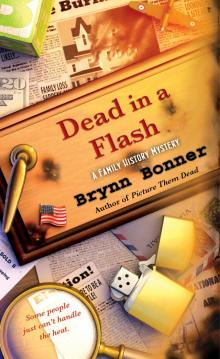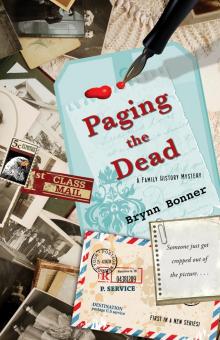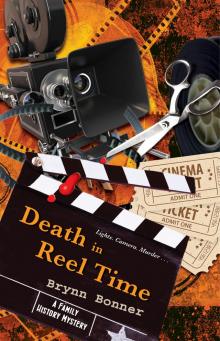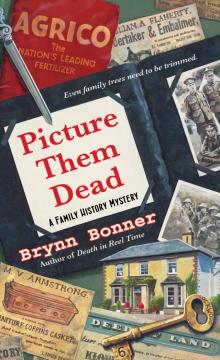- Home
- Brynn Bonner
Dead in a Flash Page 15
Dead in a Flash Read online
Page 15
Lily Rose shook her head. “It was that magazine article that stirred it all up again. And poor Lincoln took that upon himself. He was the one who’d arranged for the senator to give that reporter, Chad Deese, an interview. I say reporter, but he’s not a political reporter. He’s a freelancer who writes human-interest pieces and Lincoln expected him to do a nice profile piece for Stan’s birthday. He felt blindsided when that article came out. I’d never seen him in such a temper. I dreaded to think what might happen when he caught up with that Deese fellow. Funny, isn’t it; now I wish I had that worry back.”
We chatted on about more pleasant things for a few more minutes and as we were getting ready to leave, Conrad came out to join us. “Am I interrupting anything?” he asked.
“Not at all,” I said. “We were just saying good-bye; I’ve got work to do on someone’s family tree.”
“Then you must go,” Conrad said. “I wasn’t sure if you knew, Lily Rose, that we’ve lagged behind the others. Phoebe isn’t feeling well.”
“Oh, I’m so sorry to hear that, Conrad,” Lily Rose said. “Nothing serious, I hope.”
“Just one of those pregnant lady things, I think. To be expected, the doctors tell us. I hope she’ll be feeling better in the morning and we’ll drive over for the funeral then. And Aunt Yvonne’s stayed behind, too. She’ll go over with us. Aren’t we lucky? In any case, I thought I’d meander down and keep you company for a while.”
“Sarah sent you, didn’t she?” Lily Rose said with a laugh. “So much for my sovereignty.”
“She might’ve mentioned you were down here,” Conrad said with a smile, “but truth be told, I’ve been kicked out of our room while Phoebe naps, so I’d love your company.”
“Delighted,” Lily Rose said with a nod. “Today, of all days, I’m glad to have company.”
“And how, might I ask, are you progressing on my wedding gift?” Conrad asked, settling his lean frame onto the wrought iron chair next to Lily Rose.
“Very well,” I said, hoping he didn’t detect the slight flinch as I thought of how much was yet to be done. “Despite her feelings about the project, your aunt Yvonne’s information was a big help.”
“And it was such a joy to extract it from her, wasn’t it?” he said with a laugh. “Though you managed to get more than I did. I don’t understand her. I’ve never come across anyone so virulently anti-genealogy before. People who think it’s a bore, sure. People who give it a halfhearted try but just can’t get into it, those aplenty. But she acts like we’re dabbling in the black arts.”
“You’d be surprised at the attitudes we get,” Esme said.
“It’s true,” I said, “sometimes people aren’t exactly proud of what they find out about their ancestors. And some are foresworn never to speak of the black sheep to outsiders. Sometimes that gets inculcated into generations, even when the big secret doesn’t matter anymore. We’ve had people request that we destroy all the research we’ve done for them when we unearth something not to their liking.”
Conrad laughed. “I hardly think Aunt Yvonne could have any deep dark secrets. She’s lived a very circumscribed life, in the same town, with the same small circle of friends, most of whom she’s outlived, and up until her retirement, the same civil service job pushing papers around for thirty years.”
“Speaking of papers,” I said, suddenly remembering a loose end I’d meant to follow up on, “do you happen to remember a blue envelope with maybe a letter in it that was stuck in the back of your baby book?”
“I had a baby book?” Conrad asked. “I don’t remember ever seeing one. That surprises me. My mother wasn’t the sentimental type.”
“It’s the preprinted kind and not a whole lot is filled out,” Esme said.
“Now, that sounds like my mother,” Conrad said, chuckling. “But what is the significance of this letter?”
“None that we know of. We’re just trying to make sure we have everything that could help us plot your family line.”
“What I showed you the other day is all I’ve got. I was living out west when Dad died and only came back for the funeral. It fell to Dinah Leigh to clear out and sell the house. She collected any personal things we’d want to keep. I guess there wasn’t much. As I say, my mother was a minimalist.”
“We don’t like minimalists,” Esme said with a smile. “We much prefer the packrat mentality. Every artifact, every piece of ephemera, every letter, photo, card, or bill—they’re like bread crumbs we can follow.”
“Well, I’m afraid you’d be lost in the piney woods forever if you depended on my mother’s feeble collection of keepsakes to lead you anywhere.”
“I think that’s our signal to get back on the hunt,” I said. “We’ll drop by to see you again soon, Lily Rose. And I hope Phoebe feels better.”
“Oh, I trust she will,” Conrad said. “She’s pampered here in this lovely place. She’s going to feel quite let down when we go back to ordinary life.”
We were headed down the broad flagstone steps toward the visitor lot when, out of nowhere, a young man stepped in front of us. He was a redhead and looked to be in his thirties. And if I’d had to guess, he’d spent most of his life beanpole skinny. But he’d bulked up and now his black T-shirt stretched across a muscular chest.
“You’re Esme Sabatier and Sophreena McClure,” he said, a statement, not a question.
We admitted that we were, exchanging brief glances that confirmed neither of us knew the guy.
“I understand Senator Sawyer hired you to look into the investigation of the fire that supposedly killed his younger brother all those years ago. What have you discovered about the mystery of the child’s disappearance? Are you confident you’ll find baby Johnny? Will the parents be vindicated?”
I saw he had a lavalier mic clipped to his shirt and the dime dropped. Chad Deese.
Esme stiffened. I recognized the danger sign, but Deese didn’t.
“Do you have anything to share with my readers?” Deese persisted.
I knew engaging him would only make him harder to shake. Even a No comment would be incentive.
I went to move around him and he sidestepped into my path. “Anything?” he repeated.
I looked at him closer and saw he had a purple ring under one eye. He’d tried to disguise it with makeup but it was still swollen and the bruising showed through.
“Where’d you get the shiner?” I asked, moving a step closer to him. “Did Lincoln Cooper find you? What do you know about Lincoln’s death?” I stepped closer still.
That usually worked to back a person down, but Deese wouldn’t be cowed.
“I had nothing to do with Cooper’s death. I hardly knew the guy. I’ve been questioned by the police and cleared,” he said calmly. “But okay, let’s go with that one. What can you tell me about the Cooper investigation?”
“Nothing,” I said and tried to step around him again.
“Okay,” he said, blocking my way again. “Back to my story, then. Why reopen the inquiry now? Has new evidence come to light on the John David Sawyer case? Was the family hiding something all these years?”
This time it was Esme who crowded into his space, and he did step back. “We have no comment about anything. But I would like to know what’s got a burr under your saddle when it comes to Senator Sawyer? Is this about your uncle Russell?”
Esme was now nose to nose with Deese, though she had to bend down to accomplish that.
“Uncle Russell?” he said. “Who is Uncle Russell? I just want a statement. Anything you can tell me. Was the fire intentional?”
I looked back at the hotel and saw a man wearing the hotel blazer watching us as he spoke into a walkie-talkie. I raised my hands slowly as if in surrender.
Within seconds security guards came charging out and suddenly Deese was the one answering questions. No, of course he wasn’t trying to rob us. Freedom of the press, yada yada.
Esme and I demurred when asked if we’d like to press charges and
went on our way, leaving the guards to deal with Deese.
“How did he hear about this?” I hissed once we were out of earshot.
“Lots of people know,” Esme said. “I mean aside from those we’ve talked with, they discussed it with us in the middle of a crowded restaurant. Anyone could’ve overheard. The question is, what’s this guy’s deal? Either he’s a good actor or this has nothing to do with his distant kin in Quinn County.”
“Well, you heard what Lily Rose said, he’s just a stringer. He’s probably trying to parlay the interest he stirred up with that story on the senator into a staff job somewhere.”
“Maybe, but it seems more personal,” Esme said.
I opened the door of Esme’s SUV and prepared to climb in. This was no challenge for Esme but it left me wishing for ropes and pulleys or maybe a small catapult. Just then Patricia Benson came roaring into the parking lot in a silver Jaguar, hardly slowing as she whipped into the space behind us.
She didn’t notice us until she was out of the car, jerking at the strap of her handbag, which seemed to be caught on something inside the car.
“Oh, hey,” she said, wresting it loose with a grunt.
“You don’t use the valet service?” I asked.
“I’m going out again in a little bit and it takes more time than it’s worth,” Patricia said. “I’m going stir-crazy.”
Esme turned her gaze to the hotel, then looked back at Patricia. “I can think of worse places to go crazy in.”
“I know, I know,” Patricia said. “Who complains about staying in a place like this? It’s wonderful, lovely, expensive, extravagant, all those good things, but I just need to get out. I’m so desperate I volunteered to take the thank-you notes to the post office.”
“Have you changed your mind about going to Lincoln’s funeral?” I asked.
“No, we’ll go over in the morning. Aunt Lenora would expect us to stay with her and it’s nice of her to offer, but she has a houseful and I’d rather have cabin fever here in the lap of luxury than sleep on a futon in her den.”
We looked up to see Chad Deese crossing into the parking lot at the far end. He caught sight of us and turned abruptly to take a meandering path to his car. I wasn’t much surprised to see it was a beat-up Toyota. He drove past us, rolling down his window. “Nice trick,” he called. “I’ll be in touch.”
“Who’s that?” Patricia asked as Esme muttered under her breath, giving Deese the death stare.
“The guy who wrote that piece that upset the senator and Lenora,” I said. “He’s somehow found out we’ve been hired. We were trying to figure how he got wind of it.”
“Well, don’t look at me,” Patricia said. “Marc won’t let me talk to reporters unless he’s there to pull my foot out of my mouth. I don’t have much tolerance for imbecilic questions. That’s another thing I’m trying to work on.”
“I expect you’ll have to build up a tolerance if you want to be in public life,” Esme said.
“I know,” she said with a sigh. “I’m a work in progress. Hey, I’m glad I ran into you. There are a few things up in Mother’s room that got left out of that box of family stuff. We were looking at them when Chelsea boxed everything up and they didn’t get put back in. Do you want to come back up and get them now or shall I bring them to you later?”
I glanced at my watch. “We’ll come up with you,” I said, hoping whatever I could glean from the missing items might wrap up the job we were doing for Dinah Leigh. Maybe Emma’s missing blue envelope would be in this batch. I hate loose ends.
We followed Patricia, chatting along the way. It struck me how different she was when she was away from her family. She was friendly, engaged—and likable. This Patricia could be a very appealing candidate, at least as far as campaigning was concerned. I knew nothing of her politics.
Once in the suite, we heard sounds coming from the adjoining room, Chelsea’s. Patricia frowned and went to investigate. The door was open a crack and when she swung it wide, Marc stood abruptly and slammed a desk drawer closed.
“What are you doing in Chelsea’s room?” Patricia asked.
“Looking for a highlighter,” Marc said. He came back into the suite, closing the door behind him. “I was working on the talk you’re giving to that men’s club.” He gestured toward the table. “I wanted to highlight the important points you should cover.”
We all glanced toward the papers. The top page was striped with neon yellow and a highlighter was beside it on the desk.
He looked over to where we were staring and lifted a shoulder. “It went dry,” he said.
Patricia picked up the sheaf of papers and thumbed through them, a neon glow lighting up every page.
“Well, Marc,” she said, “you certainly know how to sort out what’s important and what’s not.”
“Wish I could say the same for you, Patricia,” he said, grabbing the papers and stalking from the room.
* * *
“Alas, no blue envelope,” I said once we were back in the car and I’d had a chance to look at the items Patricia had given us. “Three snapshots, a couple of Christmas cards, and a receipt for a new car, a nineteen forty-nine Ford. The Nelsons paid $1,652 for it. They got a whole car for what we’d pay in taxes and fees these days. Oh, and here’s a photo of their father, Herbert, standing next to the car. This is the first one I’ve seen of him standing. He was short. And their mother, Marie, was petite, too. Conrad obviously got a recessive tall gene.”
“It happens,” Esme said. “I’m taller than either of my parents.”
“You’re taller than almost everyone. Works in reverse, too. Dad was a six-footer, Mom was average height, and I’m a shorty.”
“You’re quality, darlin’, not quantity,” Esme said. She took a hand off the wheel to reach up and rub her temple. I recognized this gesture well enough.
“Esme, are you getting something?”
“Something from someone about something,” she said. “Or maybe I’ve just been studying everything we’ve collected about that fire too hard. Or maybe it’s got nothing to do with that. I keep seeing a man’s hand, a rough, work-hardened hand. It’s reaching for something, and then there’s terrible pain.”
“Pain in the hand?” I asked.
Esme nodded. “Just unbearable pain. Kind of sums up both of these jobs we’ve taken on. Except our pain is in a different body region.”
* * *
“Do you know that even when bodies are burned for two hours at two thousand degrees there are still bone fragments left?” Esme asked.
“No,” I said, uncurling from my hunched position over the family tree. “But that’s a really horrifying bit of info, thanks for that.”
“I know,” Esme said, “but it’s got me bothered up. I read through all the reports and it doesn’t seem like the fire at the Sawyer house lasted nearly that long. And another thing, do you recall what Lily Rose told us about Margaret Sawyer keeping the window in the baby’s room down ’cause there was a hole in the screen?”
“Yeah,” I said, warily. “What about it?”
“In this picture here,” she said, getting up to bring a printout over, “you can see there’s no screen on that window, none at all. But there’s one over here propped against the pump house. You can make it out even in these old grainy photos.”
I shrugged. “Maybe the people fighting the fire took it down. Or it fell off when the heat distorted it or something. What are you thinking?” I asked.
“I don’t know. Mostly I’m just thinking we’re in a strange position with this job. We’re essentially hoping to find out the baby died in that fire. It’s wearing on me.”
“Oh, Esme, we’re not hoping for that. We’re simply looking for the truth. Just like we always do.”
“Yes,” Esme said, “but in this case we’ve been hired to prove that baby died and at the same time that the parents weren’t mentally unbalanced for claiming he didn’t. We’re walking a tightrope. And I feel my legs starting
to tremble.”
The doorbell saved me from having to answer, which was good because I had nothing. I pulled the door open with the intention of dispatching whoever it was so I could get back to work, but I was dumbstruck to find Dinah Leigh’s aunt Yvonne standing on our front porch and a taxi idling in our driveway.
“I need to talk to you,” she said. “He’ll wait.” She jerked her head toward the cab.
It took me a moment to find my manners. “Of course,” I said. “Please come in.”
“The other one, too. Your partner, that tall drink of water, I need to talk to both of you. I’ll make it quick,” Yvonne said.
I ushered her into the family room and went across the hall to get Esme. I was wondering how I might’ve offended this old woman since she was clearly put out about something. I couldn’t come up with anything other than the fact that she didn’t like what I do for a living, which she’d already made quite clear.
I offered tea or coffee and Yvonne waved the offer away, but lifted her cigarette pack and trusty Zippo in our direction. “Mind if I smoke?”
“Yes,” Esme answered. “It gets in the upholstery and stinks to high heaven. If you need to smoke, we’ll move this out onto the patio.”
“Lead the way,” Yvonne said, not at all fazed by Esme’s less-than-gracious hospitality.
We settled around the patio table and waited as she lit up. “Okay, here’s the deal,” she said. “You’ve got to keep Conrad from doing that DNA crap.”
“Well, first off, I can’t prevent him from doing whatever he wants,” I said. “But is there a particular reason?”
“Yes,” Yvonne said. She fell silent, her lips set in a hard line. She sat still as a stone for a long while. Finally she picked a bit of tobacco off her tongue with her fingertips and let out a long, forlorn sigh.
“Conrad’s adopted,” she said. “It was a closed adoption. Very closed. Nailed-shut-forever closed. At least it was supposed to be before all this techno-mumbo-jumbo came along.”
“Well, that’s interesting, but not earth-shattering,” Esme said, waving away the smoke curling in her direction. “Times have changed. There’s no stigma on adoption anymore.”

 Dead in a Flash
Dead in a Flash Paging the Dead
Paging the Dead Death in Reel Time
Death in Reel Time Picture Them Dead
Picture Them Dead